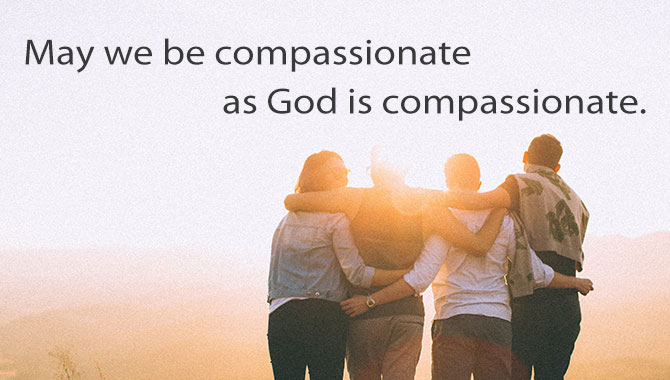August 22, 2021
Be compassionate as God is compassionate. ~Luke 6:36 (New Jerusalem Bible)
My dad got diabetes in his early 40’s just like his father before him. Over the years the disease ravaged my dad’s once healthy, vibrant body. His eyesight became quite poor, his kidneys failed, and he was on dialysis three times a week. Dad was in and out of doctors’ offices. Eventually, he had several toes amputated. A few months later doctors removed his foot; and, as things got worse, they amputated his leg just below the knee. My grandfather, years prior, also had his leg amputated due to complications from diabetes.
My mom said one day she walked into their bedroom and Dad was sobbing uncontrollably, so much loss and so much suffering. He looked at Mom and said, “I didn’t know. I had no idea what my dad had to go through.” My dad’s anguish connected him to his father and others in a deep and profound way. His compassion and empathy for others’ suffering grew exponentially.
Henri Nouwen writes, “The first step we take as we move from sorrow to joy is to face and mourn our losses. The second step is to connect our suffering with that of the larger world, to see our suffering/pain/grief in light of the suffering of others.” Has our pain led us to more empathy and compassion?
All of us have experienced different degrees of sorrow and pain. It is a natural part of life. “When we begin to feel the pain of our lives in relation to other people’s pain, we can face it together,” says Nouwen. We share a common experience that unites us and heals us.
When Jesus sees Martha, Mary, and their community weeping over Lazarus’s death, “he was greatly disturbed in spirit and deeply moved,” (John 1:33). Compassion moves him to weep with them. As Nouwen says, a doctor’s primary task is to take the pain away. Our task is to mutually share the pain.
“This is healing because it does not take away the suffering or pain of another but invites them to recognize their sorrow on a level where it can be shared.”
What happens when we identify our pain with someone else’s pain? Does healing take place? Does our sorrow and theirs become less? Is this what Jesus meant when he said, “Come to me all you who are weary and carrying heavy burdens and I will give you rest,”? (See Matthew 11:28).
Father Greg Boyle writes, “When the feeling’s mutual, we are seized by a tenderness that elevates us to the very largeness of God.” Compassion, to suffer with another person, is healing. We realize we are in the same boat together, and we need one another to “walk through the valley of the shadow of death.” We experience what Father Greg calls “exquisite mutuality.” “Our compassion opens our hearts,” says Nouwen, “to a wider world of suffering and loss—refugees, starving children, addictions, fear, loneliness, aging, and dying.”
We are all part of the same human drama trying to overcome the challenges of this life as we walk with one another, angels, and the Spirit. Rohr says, “God uses tragedy, suffering, pain, betrayal, and death itself, not to wound or punish us, but to bring us to a Larger Identity.” Our shared pain can unite us, heal us, and restore us.
When we start connecting our pain/grief to the larger world, our common humanity, then we become part of the grand restorative narrative: lost and found, exile and return, death and resurrection. We move from sorrow to joy.
I have shared with you before a transformative moment in my life. I was sitting in the Jefferson County Courtroom for the sentencing trial of Roosevelt Brackens, the man who took my sister’s life. I was numb, full of sorrow, and deeply wounded.
Roosevelt’s father stood up to address the judge. Mr. Brackens could not speak as he sobbed uncontrollably. His body shook in a sad, desperate mourning. While I lost my sister to a senseless act of violence, Mr. Brackens was losing his son to life in prison. As he cried, I realized his sorrow and pain were my sorrow and pain as well. All of us in that courtroom that day shared a deep, tragic loss.
After the sentence was read, Jennifer and I along with Mr. Brackens and his family met in the center aisle of the courtroom face to face. We did not know what to do. I walked toward Mr. Brackens with my arms open and we embraced one another and cried tears of resurrection. All of us embraced. Exquisite mutuality.
May we be compassionate as God is compassionate.
May we share our sorrows and pain with one another.
May our sorrows turn to joy.
Blessings and peace,
Craig

